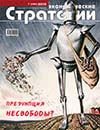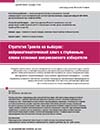Trump’s Election Strategy: Neuromathematical Key to Deeper Layers of the American Voter Consciousness
DOI: 10.33917/es-7.165.2019.78-93
The key factor determining success of Trump’s election strategy was the use of cognitive neurophysiology methods — digital identification of a virtual doppelganger of a real voter in information and social networks. Semantization of the states of consciousness and psyche of individuals, being identified in the Global Network, on the basis of computational decisions allows to encapsulate (grab) an integral position that suits most people available for monitoring in order to set the vector of stable convergence of Trump’s election platform and the views of a particular American voter described and analyzed. Identification allows to influence the dominant focus of the emotional-imagination block for remote cognitive correction of the people’s political position in conditions of strategic bifurcation (elections). Russian developments in the field of personality neuro-management are also of great scientific and practical importance
References:
|
1. Ageev A.I. Repertuar vlastvovaniya [The Repertoire of Domination]. Ekonomicheskie strategii, 2013, no 8, p. 5. 2. Ageev A.I., Loginov E.L., Shkuta A.A. Konvergentnyi monitoring i programmirovanie lichnosti kak instrument operirovaniya intellektual’noi dinamikoi povedeniya bol’shikh grupp lyudei [Convergent Monitoring and Programming of Personality as a Tool for Managing Intellectual Dynamics of Behavioral Activity of Large Groups of People]. Ekonomicheskie strategii, 2018, no 2, pp. 70–87. 3. Vetrov D.P. Mashinnoe obuchenie — sostoyanie i perspektivy [Machine Learning — the State and Prospects]. Trudy XV Vserossiiskoi nauchnoi konferentsii RCDL’2013 [Selected Papers of the 15th All-Russian Scientific Conference RCDL’2013]. Elektronnye biblioteki: perspektivnye metody i tekhnologii, elektronnye kollektsii. Yaroslavl’: Yaroslavskii gosudarstvennyi universitet im. P.G. Demidova, 2013, pp. 21–27. 4. Ageev A.I. Vybor identichnosti [Choice of Identity]. Ekonomicheskie strategii, 2014, no 1, p. 5. 5. Loginov E.L., Raikov A.N., Shkuta A.A. Ispol’zovanie neirotekhnologii pri programmirovanii kognitivno-povedencheskikh stereotipov deistvii lichnostei dlya ustoichivogo funktsionirovaniya sistem upravleniya sotsiumom [Applying Neurotechnology While Programming Cognitive-Behavioral Stereotypes of Personality Actions for Stable Functioning of Social Management Systems]. Neirokomp’yutery: razrabotka, primenenie, 2018, no 9, pp. 34–45. 6. Ageev A.I. Predprinimatel’stvo: problemy sobstvennosti i kul’tury [Entrepreneurship: Property and Culture Issues]. Moscow, Nauka, 1991, 112 p. 7. Rassledovanie Das Magazin: kak Big Data i para uchenykh obespechili pobedu Trampu i Brexit [Das Magazin’s Investigation: How Big Data and a Pair of Scientists Provided Victory for Trump and Brexit]. The Insider, available at: https://theins.ru/politika/38490. 8. Gnezditskii V.V., Korepina O.S., Chatskaya A.V., Klochkova O.I. Pamyat’, kognitivnost’ i endogennye vyzvannye potentsialy mozga: otsenka narusheniya kognitivnykh funktsii i ob”ema operativnoi pamyati bez psikhologicheskogo testirovaniya [Memory, Cognitiveness, and Endogenous Evoked Brain Ppotentials: Assessment of Cognitive Deterioration and RAM Capacity Without Psychological Testing]. Uspekhi fiziologicheskikh nauk, 2017, no 1, pp. 3–23. 9. Emelin K.E., Akhapkin R.V., Aleksandrovskii Yu.A. Kognitivnyi profil’ patsientov s depressivnymi rasstroistvami i ego znachenie dlya antidepressivnoi terapii i sotsial’nogo funktsionirovaniya [Cognitive Profile of Patients with Depressive Disorders and its Significance for Antidepressant Therapy and Social Functioning]. Obozrenie psikhiatrii i meditsinskoi psikhologii imeni V.M. Bekhtereva, 2018, no 1, pp. 23–32. 10. Zelenina N.V., Nagibovich O.A., Ovchinnikov B.V., Yusupov V.V. Vozmozhnosti ispol’zovaniya sovremennykh dostizhenii psikhogenetiki v interesakh professional’nogo psikhologicheskogo otbora v Vooruzhennykh silakh Rossiiskoi Federatsii [Possibilities of Applying Modern Achievements of Psychogenetics in the Interests of Professional Psychological Selection in the Armed Forces of the Russian Federation]. Vestnik Rossiiskoi voenno-meditsinskoi akademii, 2016, no 3, pp. 245–250. 11. Apanovich Z.V. Evolyutsiya metodov vizualizatsii kollektsii nauchnykh publikatsii [Evolution of Visualization Techniques for Collections of Scientific Publications]. Russian Digital Libraries Journal, 2018, no 1, pp. 1–42. 12. Abramov E.S., Basan E.S., Basan A.S. Razrabotka sistemy upravleniya urovnem doveriya v mobil’noi klasternoi besprovodnoi sensornoi seti [Development of a System for Trust Level Management in a Mobile Cluster Wireless Sensor Network]. Izvestiya YuFU. Tekhnicheskie nauki, 2015, no 7, pp. 41–52. 13. Gridnev S.E., Kurgalin S.D., Turovskii Ya.A. Modelirovanie povedeniya cheloveka i ego oshibok s ispol’zovaniem iskusstvennykh neironnykh setei [Modeling of Human Behaviour and Errors Using Artificial Neural Networks]. Aktual’nye napravleniya nauchnykh issledovanii XXI veka: teoriya i praktika, 2015, no 5-2, pp. 249–253. 14. Tsukerman V.D. Matematicheskaya model’ fazovogo kodirovaniya sobytii v mozge [Mathematical Model of Phase Events Encoding in the Brain]. Matematicheskaya biologiya i bioinformatika, 2006, no 1-2, pp. 97–107. 15. Ivanov V.V., Korobova A.N. Gosudarstvennoe i munitsipal’noe upravlenie s ispol’zovaniem informatsionnykh tekhnologii [State and Municipal Government with the Use of Information Technologies]. Moscow, INFRA-M, 2011, 383 p. 16. Astakhova L.V. Informatsionnoe povedenie pol’zovatelya tsifrovykh resursov kak ob”ekt tekhnologicheskogo monitoringa v obshchestve, osnovannom na znaniyakh [Information Behaviour of the Digital Resources User as an Object of Technological Monitoring in a Knowledge-based Society]. Nauchnotekhnicheskaya informatsiya. Seriya 1: Organizatsiya i metodika informatsionnoi raboty, 2018, no 10, pp. 17–25. 17. Strizhenko A.A. Izmenenie kommunikativnykh i sotsial’nykh modelei povedeniya lyudei v tsifrovuyu epokhu: mify i real’nost’ [Changing the Communicative and Social Patterns of Human Behaviour in the Digital Age: Myths and Reality]. Vestnik Altaiskoi akademii ekonomiki i prava, 2010, no 1, pp. 57–61. 18. Ivanov V.V., Korobova A.N. Gosudarstvennoe i munitsipal’noe upravlenie s ispol’zovaniem informatsionnykh tekhnologii [State and Municipal Government with the Use of Information Technologies]. Moscow, INFRA-M, 2011, 383 p. 19. Artemenkov S.L. Setevoe modelirovanie psikhologicheskikh konstruktov [Network modeling of psychological constructs]. Modelirovanie i analiz dannykh, 2017, no 1, pp. 9–28. 20. Druzhinin V.N., Biryukov S.D., Voronin A.N., Tolokonnikova E.V. Psikhometricheskoe modelirovanie testirovaniya intellekta i kreativnosti [Psychometric Modeling of Intelligence and Creativity Testing]. Informatsionnyi byulleten’ RFFI, 1996, no 4. 21. Novikov D.A., Chkhartishvili A.G. Refleksivnye igry [Reflexive Games]. Moscow, SINTEG, 2003, 160 p. 22. Agarkov V.A., Bronfman S.A., Bozhko S.A., Sherina T.F., Gurtovenko I.Yu. Vliyanie sotsial’no-psikhologicheskikh faktorov i osobennostei kul’tury na ozhidaniya rossiiskikh patsientov ot psikhoterapii [Influence of Socio-Psychological Factors and Cultural Characteristics on Expectations of Russian Patients from Psychotherapy]. Vestnik novykh meditsinskikh tekhnologii, 2014, no 1, p. 204. 23. D’yachuk P.P. (ml.), D’yachuk P.P., Karabalykov S.A., Shadrin I.V. Diagnostika neustoichivykh kognitivnykh sostoyanii aktivnykh agentov [Diagnosis of Unstable Cognitive States of Active Agents]. Neiroinformatika-2016: Sb. nauch. trudov: V 3 ch. Moscow, Natsional’nyi issledovatel’skii yadernyi universitet “MIFI”, 2016, pp. 259–270. 24. Volodenkov S.V., Miteva V.V. Osobennosti transformatsii modelei massovogo informatsionnogo potrebleniya v usloviyakh evolyutsii tekhnologii politicheskoi kommunikatsii [Peculiarities of Transforming the Models of Mass Information Consumption in the Context of Political Communication Technologies Evolution]. Grazhdanin. Vybory. Vlast’, 2019, no 2, pp. 122–133. 25. Chernigovskaya T.V., Shelepin E.Yu., Zashchirinskaya O.V. i dr. Psikhofiziologicheskie i neirolingvisticheskie aspekty protsessa raspoznavaniya verbal’nykh i neverbal’nykh patternov kommunikatsii [Psychophysiological and Neurolinguistic Aspects of Recognition of Verbal and Non-verbal Communication Patterns]. Saint Petersburg, VVM, 2016, 203 p. 26. Lefevr V.A. Refleksiya [Reflection]. Moscow, Kogito-Tsentr, 2003, 495 p. 27. Raikov A.N. Konvergentnyi sintez kognitivnoi modeli na osnove glubokogo obucheniya i kvantovykh semantic [Convergent Synthesis of Cognitive Model Based on Deep Learning and Quantum Semantics]. International Journal of Open Information Technologies, 2018, no 12, pp. 43–50. 28. Prezident Donal’d Tramp ob”yavlyaet strategiyu natsional’noi bezopasnosti [President Donald Trump Announces National Security Strategy]. US. Embassy in Belarus, available at: https://by.usembassy.gov/be/президент-дональд-трамп-объявляет-ст/ 29. Rogozhnikova T.M. Politicheskaya kommunikatsiya i verbal’naya suggestiya v formate psikholingvisticheskoi paradigmy [Political Communication and Verbal Suggestion in the Format of Psycholinguistic Paradigm]. Politicheskaya lingvistika, 2019, no 2, pp. 24–37. 30. Subbotina N.D. Suggestiya i kontrsuggestiya v obshchestve [Suggestion and Counter Suggestion in Society]. Moscow, KomKniga, 2006, 208 p. 31. Smirnov I., Beznosyuk E., Zhuravlev A. Psikhotekhnologii. Komp’yuternyi psikhosemanticheskii analiz i psikhokorrektsiya na neosoznavaemom urovne [Psychotechnologies. Computer Psychosemantic Analysis and Psychocorrection at an Unconscious Level]. Moscow, Progress, Kul’tura, 1995, 416 p. 32. Vypolnyaemye proekty [Ongoing Projects]. NITs “Kurchatovskii institute”, available at: http://www.nrcki.ru/catalog/index.shtml?g_show=34693&path=3878,34693. 33. Nauchno-prakticheskie razrabotki. Institut psikhologii Rossiiskoi akademii nauk [Scientific-Practical Developments: Institute of Psychology of the Russian Academy of Sciences]. Institut psikhologii RAN. URL: http://www.ipras.ru/cntnt/rus/institut_p/nauchnopra.html. 34. Makarov V.L., Bakhtizin A.R., Sushko E.D. Mul’tiagentnye sistemy i superkomp’yuternye tekhnologii v obshchestvennykh naukakh [Multi-agent Systems and Supercomputer Technologies in Social Sciences]. Neirokomp’yutery: razrabotka, primenenie, 2017, no 5, pp. 3–9. 35. Makarov V.L., Bakhtizin A.R., Sushko E.D., Sushko G.B. Modelirovanie sotsial’nykh protsessov na superkomp’yuterakh: novye tekhnologii [Modeling Social Processes on Supercomputers: New Technologies]. Vestnik Rossiiskoi akademii nauk, 2018, no 6, pp. 508–518. 36. Denisov A.A., Denisova E.V. Konstruirovanie abstraktnykh soznanii [Construction of Abstract Consciousness]. Informatsionnye voiny, 2013, no 1, pp. 2–13. 37. Denisov A.A., Denisova E.V. Teorema i paradoks bar’era osoznaniya [Theorem and Paradox of Awareness Barrier]. Ekonomicheskie strategii, 2015, no 5–6, pp. 142–157. 38. Vaino A.E., Kobyakov A.A., Saraev V.N. Obraz Pobedy [Image of Victory]. Moscow, Institut ekonomicheskikh strategii RAN, kompaniya GLOWERS, 2012, 140 p. 39. Psikholingvisticheskaya ekspertnaya sistema VAAL [Psycholinguistic Expert System VAAL]. VAAL, available at: http://www.vaal.ru/prog/rukov.php. 40. Audial’naya programma “Bimental’” [Audio Program “Bimental”]. Mirmageric.ru, available at: https://mirmageric.ru/prs.php?str=bmental 41. Bugaev A.S., Loginov E.L., Raikov A.N., Saraev V.N. Semantika setevykh kontaktov [Semantics of Network Contacts]. Nauchno-tekhnicheskaya informatsiya. Seriya 1: Organizatsiya i metodika informatsionnoi raboty, 2009, no 2, pp. 33–36. 42. Ageev A.I., Loginov E.L. Neiromenedzhment lichnosti [Neural Management of Personality]. Moscow, Institut ekonomicheskikh strategii, 2019, 120 p. 43. Ageev A.I., Loginov E.L. Bitva za budushchee: kto pervym v mire osvoit noomonitoring i kognitivnoe programmirovanie sub”ektivnoi real’nosti? [Battle for the Future: Who Will Be the First in the World to Master the Noomonitoring and Cognitive Programming of Subjective Reality?]. Ekonomicheskie strategii, 2017, no 2, no 124–139 |



